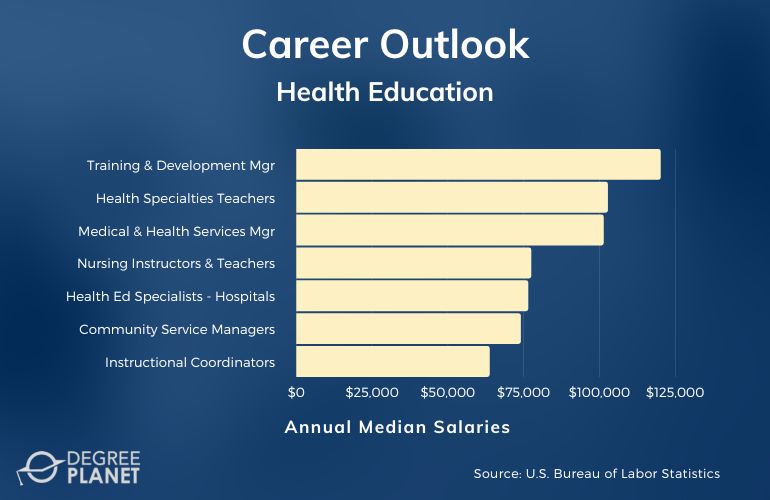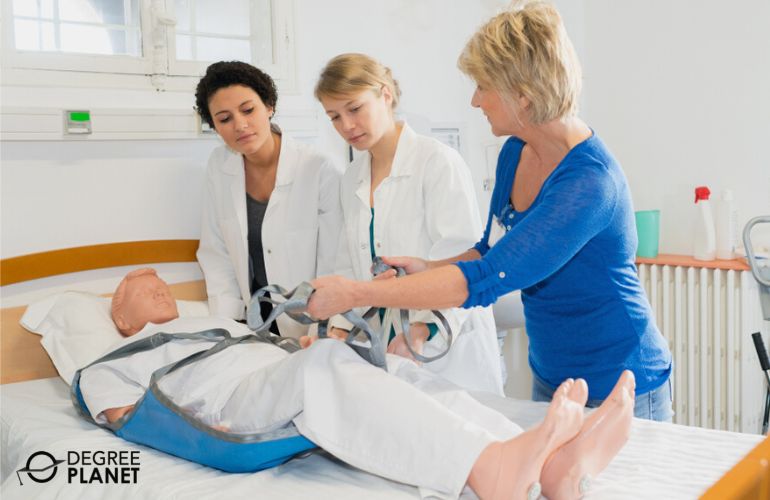If you are a current health professional, earning a masters in health professions education could help you make an even greater impact through educating future healthcare workers in your field.

Through studying theory, research, and application, you can develop academic and leadership skills to help you become an effective educator in classroom or clinical settings.
Editorial Listing ShortCode:
An online master’s in health professions education offers flexibility with distance learning and is appropriate for health professionals at nearly any career stage.
Online Masters in Health Professions Education Programs

The Master of Health Professions Education is designed for health professionals looking to move into an educational leadership position. This degree can also be complementary to health professionals who train residents or new workers on the job.
Health educators are employed in a variety of settings, including:
- Hospitals
- Clinics
- Schools and universities
- Non-profits
- Businesses
- Government
If you currently work in a healthcare field and are interested in educating future health professionals, then you might consider earning a health professions education degree online. By offering a flexible schedule with coursework that is done completely remotely, this online community health education degree program is a strategic option for professionals who wish to continue working full-time while earning a degree.
Editorial Listing ShortCode:
In a health professions education masters program, you can develop the specialized knowledge and skills to become an educational leader in your specific health field. Common topics of study include:
- Curriculum design and implementation
- Instructional technology
- Program assessment and evaluation
- Educational leadership tools
- Effective research methods to inform instruction and practice
Instead of focusing on only one type of medical education, this program is designed to cover a wide range of health profession education contexts.
Graduates may pursue different types of leadership roles, including community educators, academic faculty, and training and development specialists. Health professionals may also work as program coordinators in a variety of disciplines and places of employment.
Health Education Careers & Salaries

Most graduates go on to become health professions educators, but health education is a diverse field with a range of job titles. According to the Bureau of Labor Statistics, the following careers and median salaries are related to the field of health education.
| Careers | Annual Median Salaries |
| Training and Development Managers | $120,130 |
| Postsecondary Health Specialties Teachers | $102,720 |
| Medical and Health Services Managers | $101,340 |
| Postsecondary Nursing Instructors and Teachers | $77,440 |
| Health Education Specialists — Hospitals | $76,450 |
| Social and Community Service Managers | $74,000 |
| Instructional Coordinators | $63,740 |
| Training and Development Specialists | $61,570 |
| Career and Technical Education Teachers | $61,160 |
| Health Education Specialists — Outpatient Care Centers | $54,060 |
Many health professionals with a background in education go on to create, oversee, or teach educational programs in schools or healthcare organizations.
Editorial Listing ShortCode:
Health professions educators may also have options to work in media, government, business, and nonprofit sectors.
MS in Health Professions Education Curriculum & Courses

The coursework for health professions education graduate programs incorporates educational theory, research, and instructional strategies. Here are some examples of courses you may come across:
- Principles of Health Education: This course provides an introduction to the profession of health education with a focus on the roles and responsibilities of an educator.
- Fundamentals of Teaching and Learning: This course introduces teaching and learning principles in the context of health education. You will be guided through the instructional cycle of planning, instruction, and assessment.
- Curriculum Design: This course provides knowledge and tools for developing curriculum.
- Instructional Strategies in Health Professions Education: This course guides you through best practices for instruction, with a focus on creating engaging learning experiences using a variety of instructional modalities.
- Research Methods: This course examines historical and current research and provides techniques for research design and analysis.
- Evaluation and Assessment: This course introduces basic principles of assessment as it relates to instruction and research. You can learn how to create, use, and interpret reliable evaluation tools.
- Philosophy of Higher Education: This course examines philosophies in higher education in order to guide students in their decision-making as instructors and administrators.
- Diversity in Higher Education: This course analyzes the effect that different forms of diversity have on higher education and how educators can use their leadership to create positive change.
- Education Policy: This course explores the process of creating, implementing, and analyzing policy in higher education at the local and national levels.
- Practicum or Capstone Project: This course guides you through selecting and carrying out an in-field practicum or scholarly project. This requirement varies by program and is tailored to individual student interests.
In addition to required core courses, many programs offer optional electives that may suit your individual interests and professional goals.
Admissions Requirements

A masters in health professions education program is intended for health professionals interested in advancing their teaching and education skill sets.
While programs can vary in their admission requirements, here are some common criteria:
- Bachelor or graduate degree in a health field
- Work experience in a health professions discipline
- Letters of recommendation
- Personal statement
- GRE scores (only some schools require them)
You can look online to verify the specific requirements for the programs you are interested in. For example, some programs require bachelor holders to have significant work experience but allow terminal degree holders to apply with no work experience.
Accreditation

When you’re deciding on an online masters in health education program, it’s important to make sure the school is regionally accredited. If an educational institution is regionally accredited, it means that the school meets a certain set of quality education standards.
Editorial Listing ShortCode:
Attending a school that is regionally accredited is beneficial for several reasons. Primarily, it’s often required in order to receive financial aid, and it ensures your degree is accepted by employers and professional organizations. To verify that the schools you are interested in are accredited, you can visit the Council for Higher Education Accreditation’s website.
Financial Aid and Scholarships

The cost of higher education programs can play a large role when considering going back to school. Fortunately, there are several financial aid options to explore.
You may qualify for student loans, grants, or work-study programs through the federal government. You can complete the Free Application for Federal Student Aid (FAFSA) online to see if you qualify for government aid. There are also a variety of private scholarships offered through schools, charitable organizations, and professional societies, depending on your background and professional area of interest.
If you are working full-time, you can also check with your employer, as many companies have tuition assistance programs.
What Is an MHPE Degree?

A Master of Health Professions Education (MHPE) degree is designed to produce effective educators in health disciplines.
In most MHPE programs, the content can be organized into these categories:
- Teaching and learning
- Curriculum development
- Performance assessment
- Educational research methods
- Leadership and administration
With this degree, many health professionals develop a deeper understanding of curriculum and instruction and gain valuable skills for being effective instructors in their field. An MHPE degree covers a wide range of health profession contexts, so it is relevant to students from a variety of disciplines.
Who Is the Masters in Health Professions Education Degree For?

A masters in health professions education degree is designed for current health professionals at any career stage who want to be instructional or educational leaders in their field.
Students may be health professionals from a diverse range of fields, including but not limited to:
- Medical
- Nursing
- Pharmacy
- Dentistry
- Therapy
This degree is intended for professionals who want to serve in educational leadership positions in academia, professional societies, or healthcare organizations.
What Can You Do with a Master’s in Health Professions Education?

Earning a masters degree in health professions education can help equip you to share your health expertise in a variety of capacities.
Many health professionals with this degree choose to become clinical educators or postsecondary instructors, teaching their specific health discipline. Other health profession educators may work as program directors, residency directors, or health researchers.
Editorial Listing ShortCode:
Common work settings include schools and universities, healthcare organizations, and health agencies. The positions you can qualify for can depend on a number of factors, such as your health discipline, your prior work experience, and your geographic location.
How Long Does It Take to Get a Health Professions Education Master’s Online?

Most online masters programs take 1 to 2 years to complete with full-time enrollment. Some schools offer accelerated programs for students who have extra time to devote to the coursework. This could enable you to earn your degree more quickly.
Many schools also offer a flex path, which does not have minimum credit enrollment requirements and allows professionals to take courses as they are able. This would extend your completion time, though, as would any part-time enrollment.
Is a Masters in Health Professions Education Degree Worth It?

Yes, a masters in health professions education degree is worth it for many students. Jobs in health education are on the rise and are expected to see faster than average growth.
For example, the Bureau of Labor Statistics projects 11% job growth for training and development specialists and 12% job growth for postsecondary teachers over the next ten years. Many health professionals want to move into educational positions as instructors or program directors, but organizations may require a teaching and learning background for these roles.
Editorial Listing ShortCode:
A masters in health professions education degree can help you develop the necessary skills and foundation in educational leadership.
Universities Offering Online Masters in Health Professions Education Degree Program
Methodology: The following school list is in alphabetical order. To be included, a college or university must be regionally accredited and offer degree programs online or in a hybrid format.

A.T. Still University offers a Master of Education in Health Professions. The curriculum is designed to provide educators with the comprehensive knowledge and skills needed to successfully instruct students in a variety of health professions. The program requires the completion of 30 credit hours. Courses cover topics like instruction design, innovative teaching strategies, instructional technologies, and research methods.
A.T. Still University is accredited by the Higher Learning Commission.

Boston University offers a Master of Science in Health Professions Education. The curriculum provides instruction in curriculum development, training, classroom and clinical teaching, and program evaluation. This flexible, program can be taken online or in-person. Typically, full-time students can finish the program’s 32 required credits in 1 year, while part-time students can usually finish in 2 years.
Boston University is accredited by the New England Commission of Higher Education.

Campbell University offers a Master of Health Professions Education. This program may be an excellent fit for students passionate about educating the next generation of healthcare providers. The 30 credit curriculum is housed fully online. Potential careers for graduates include researcher positions, leadership and training roles within the healthcare sector, and faculty appointments within academia.
Campbell University is accredited by the Southern Association of Colleges and Schools Commission on Colleges.

Hofstra University offers a Master of Science in Education in Health Professions Education. Classes are held synchronously online to help ensure flexibility for currently practicing clinicians and professionals. While the program is traditionally completed in 3 years, students can also pursue an accelerated track that can typically be completed in 1 to 2 years.
Hofstra University is accredited by the Middle States Commission on Higher Education.

Johns Hopkins University offers an online program for a Master of Education in Health Professions. This interprofessional program combines instruction from the schools of education, medicine, nursing, public health, and business.
Students can choose to specialize in either Educational Leadership or Educational Research. To graduate, students must complete a combination of concentration and core curriculum requirements for a total of 34.5 credit hours.
Johns Hopkins University is accredited by the Middle States Commission on Higher Education.

Loma Linda University offers a fully online program for a Master of Science in Health Professions Education. The curriculum is designed to provide instructors with the expertise needed to improve classroom experiences, develop curriculum, and conduct impactful research.
The program requires the completion of 48 credits. Courses cover topics such as collaborative learning, cognitive psychology, organizational behavior, and healthcare technology instruction.
Loma Linda University is accredited by the Western Association of Schools and Colleges.

At North Carolina State University, the Master’s in Education offers a specialization in Health Professions Education. This specialty is intended for health care professionals pursuing careers in education, professional training, or curriculum development. All classes can be attended 100% online. The 36 credit curriculum can be tailored to students’ individual professional goals.
North Carolina State University is accredited by the Southern Association of Colleges and Schools Commission on Colleges.

Nova Southeastern University offers a Master of Science in Medical Education. This fully online program provides numerous opportunities for networking with faculty and other students. Most students can complete the program’s 30 required credits in just 1 year. The program’s core courses cover fundamentals in evaluation, methodology, research, educational technology, leadership, communication, mentoring, and ethics.
Nova Southeastern University is accredited by the Southern Association of Colleges and Schools Commission on Colleges.

Texas A&M University offers a Master’s in Education for Health Care Professionals. Students can choose to culminate their studies in a thesis or an educational project. The program offers ultimate flexibility in online courses and full-time or part-time learning options. Students may be permitted to transfer in up to 12 of their 36 required credits from outside institutions.
Texas A&M University is accredited by the Southern Association of Colleges and Schools Commission on Colleges.

The University of Louisville offers a Master of Science in Health Professions Education. This program may be an ideal next step for practicing clinicians in fields like medicine, nursing, dentistry, or pharmacy who hope to deepen their teaching expertise. The program consists of eleven 100% online courses. Incoming students can choose between five start dates each year.
The University of Louisville is accredited by the Southern Association of Colleges and Schools Commission on Colleges.

The University of Missouri—Kansas City offers a Master of Health Professions Education. The program is intended to help health professionals of all disciplines prepare for teaching and leadership roles. Classes combine asynchronous online sessions with in-person learning opportunities. Core courses cover topics like research methods, curriculum design, program evaluation, and academic administration.
UMKC is accredited by the Higher Learning Commission.

The University of Nebraska offers a 100% Master of Health Professions Teaching and Technology. The program requires the completion of 30 credit hours. Graduates often pursue careers as clinical professors, health education specialists, pre-health academic advisors, or health promotion specialists.
The University of Nebraska is accredited by the Higher Learning Commission.

The University of Rochester offers a Master of Science in Health Professions Education. Created in partnership by Rochester’s Schools of Education, Nursing, Medicine, and Dentistry, the curriculum is suited for diverse healthcare fields. Students may complete their requirements using low residency, on-campus, or hybrid learning models. All delivery options require the completion of 30 credit hours.
The University of Rochester is accredited by the Middle States Commission on Higher Education.

The University of Texas Rio Grande Valley’s Master’s in Health Science program offers a concentration in Health Professions Education and Technology. This concentration can be completed entirely online. Sample courses include Research in Health Science, Legal and Ethical Issues in Healthcare, and Health Science Curriculum and Design. On average, students can complete their requirements in 1 year.
The University of Texas Rio Grande Valley is accredited by the Southern Association of Colleges and Schools Commission on Colleges.

Walden University offers a Master of Science in Health Education and Promotion. The program is designed for individuals who are passionate about improving the well-being and health literacy of their communities. Students can attend their courses 100% online. Up to half of the program’s 50 credits can be transferred in from outside institutions with pre-approval.
Walden is accredited by the Higher Learning Commission.
Getting Your Masters in Health Professions Education Online

If you’re a health professional who’s interested in teaching others in your field, then an online master’s in health professions education could be a strategic investment.
Masters programs in health professions education are designed to be relevant for health professionals from a variety of disciplines. Whether you want to teach in a classroom or clinical setting, a masters in health professions education can help you develop academic and leadership skills. Some professionals also go on to create, direct, and oversee educational programs in schools or healthcare organizations.
You can take the next step in advancing your career today by exploring online masters in health professions education programs from accredited universities.

